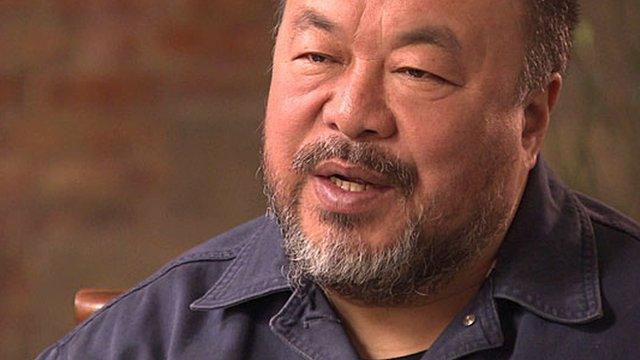Ai Weiwei creates Blenheim art show via 'virtual world'
- Published
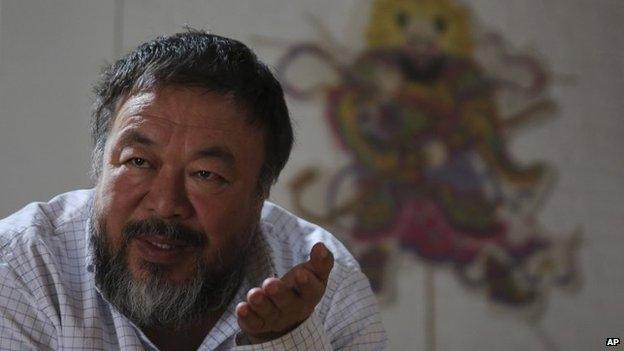
The exhibition will showcase more than 50 artworks by Ai Weiwei produced over the last 30 years
The UK's biggest exhibition of works by Chinese artist and dissident Ai Weiwei has been put together at Blenheim Palace with the help of 3D technology.
Ai, who is restricted from leaving China, helped install more than 50 artworks with a computer model of the stately home in Oxfordshire.
"We would have loved for him to be here," said curator Michael Frahm.
"We had the whole palace laser-scanned and created this virtual world that gave him access."
Uniquely, Ai's artworks - spanning some 30 years - are presented alongside the palace's own artistic treasures, some of which date back hundreds of years.
New works created for the show include a site-specific carpet measuring 45m by 2m in the Great Hall.
Also on display is a giant chandelier in the main entrance hall and Circle of Animals/Zodiac Heads: Gold (2010), the artist's reinterpretation of bronze zodiac head statues that once surrounded the fountain-clock at Emperor Yuanming Yuan's Beijing imperial retreat.
Ceramic crabs at Blenheim Palace: The BBC's David Sillito goes behind-the-scenes at the Blenheim Palace exhibit
One of the most visually striking pieces is He Xie (2010), which features 2,300 small porcelain crabs piled on the floor of a stately drawing room.
The show features Marble Surveillance Camera (2010) and 55 photographs documenting Ai's time spent in New York from 1983 to 1993.
Mr Frahm said setting up the exhibition had involved "a lot of trips to Beijing" as well as emails and Skype conversations.
"By integrating the works into the palace, we are trying to give an insight into how contemporary art can look in a 300-year old building," he said.
'Very honoured'
Speaking to the BBC in Beijing, Ai Weiwei said his inability to leave China meant he had to prepare for the exhibition remotely.
"I had to study a lot of materials, site plans and most of all the history," he said.
The artist added that his background as an architect came to the fore with his project.
The Ai Weiwei show is the first major contemporary art exhibition to be presented at Blenheim Palace, which dates back to 1704.
The home of the Duke of Marlborough, it was famously the birth place of British Prime Minister Sir Winston Churchill in 1874.
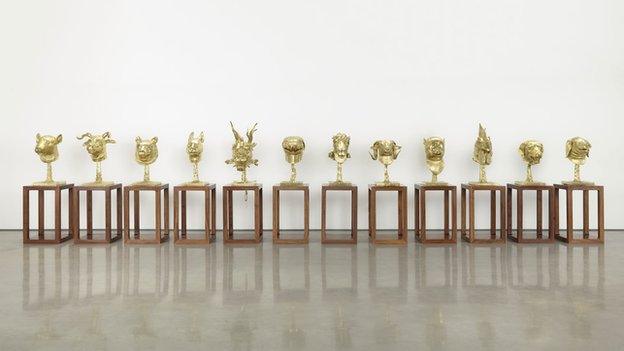
The exhibits include Ai Weiwei's Circle of Animals/Zodiac Heads: Gold
The duke's son, Lord Edward Spencer-Churchill, founder of the Blenheim Art Foundation, said the inaugural exhibition was "the culmination of long-held dream".
He told the BBC: "One struggles to find a more profound or interesting artist than Ai Weiwei and we're very honoured to have him here."
He said exhibiting contemporary art was important to help Blenheim Palace "retain its relevance".
"I think we've become a society which has become too typecast. Whether it's mixing your friends or mixing art, it makes for a much more interesting dynamic when you take things from different backgrounds and put them together."
He added: "This is not a revenue-generating exercise. Visitors are not being charged anything extra to come and see the Weiwei show. If it can widen our audience and our appeal, that will be great."
An outspoken critic of the Chinese government, Ai Weiwei was detained for almost three months without charge in 2011. After he was released, he was accused of tax evasion and fined 15m yuan ($2.4m, £1.5m).
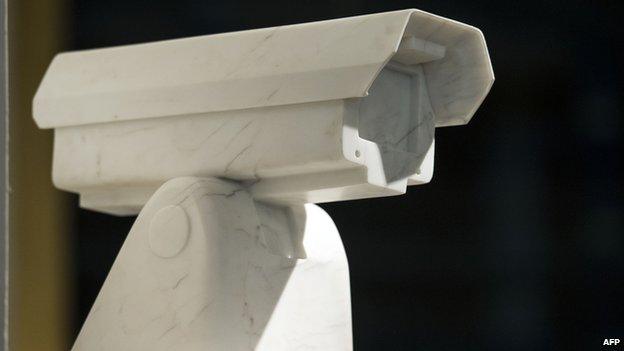
Ai Weiwei's Marble Surveillance Camera is a comment on the political climate in China
As part of his bail conditions, the Chinese authorities imposed a foreign travel ban on the artist.
Blenheim's Ai Weiwei show comes at the same time as a major exhibition in Manchester showcasing the work of artists from mainland China, Taiwan and Hong Kong.
Harry Liu, editor-in-chief of contemporary art magazine Artzip, which operates in both the UK and China, said some visitors to Blenheim might struggle to understand the political messages in Ai's work.
He also said there was more to Chinese contemporary art than just the work of Ai Weiwei.
"People also need to look at the new young generation of artists because they represent more interesting artwork and come from a different political situation."
The Blenheim Palace exhibition opens to the public on 1 October.
- Published26 September 2014
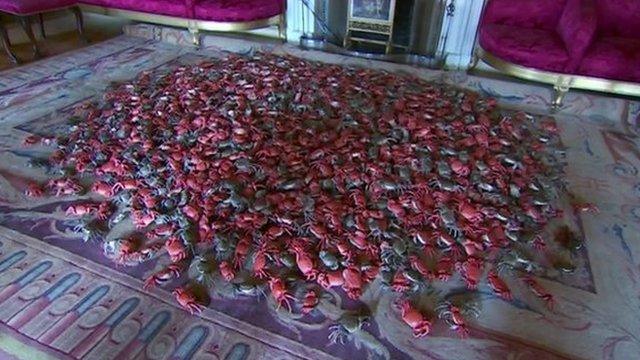
- Published26 September 2014
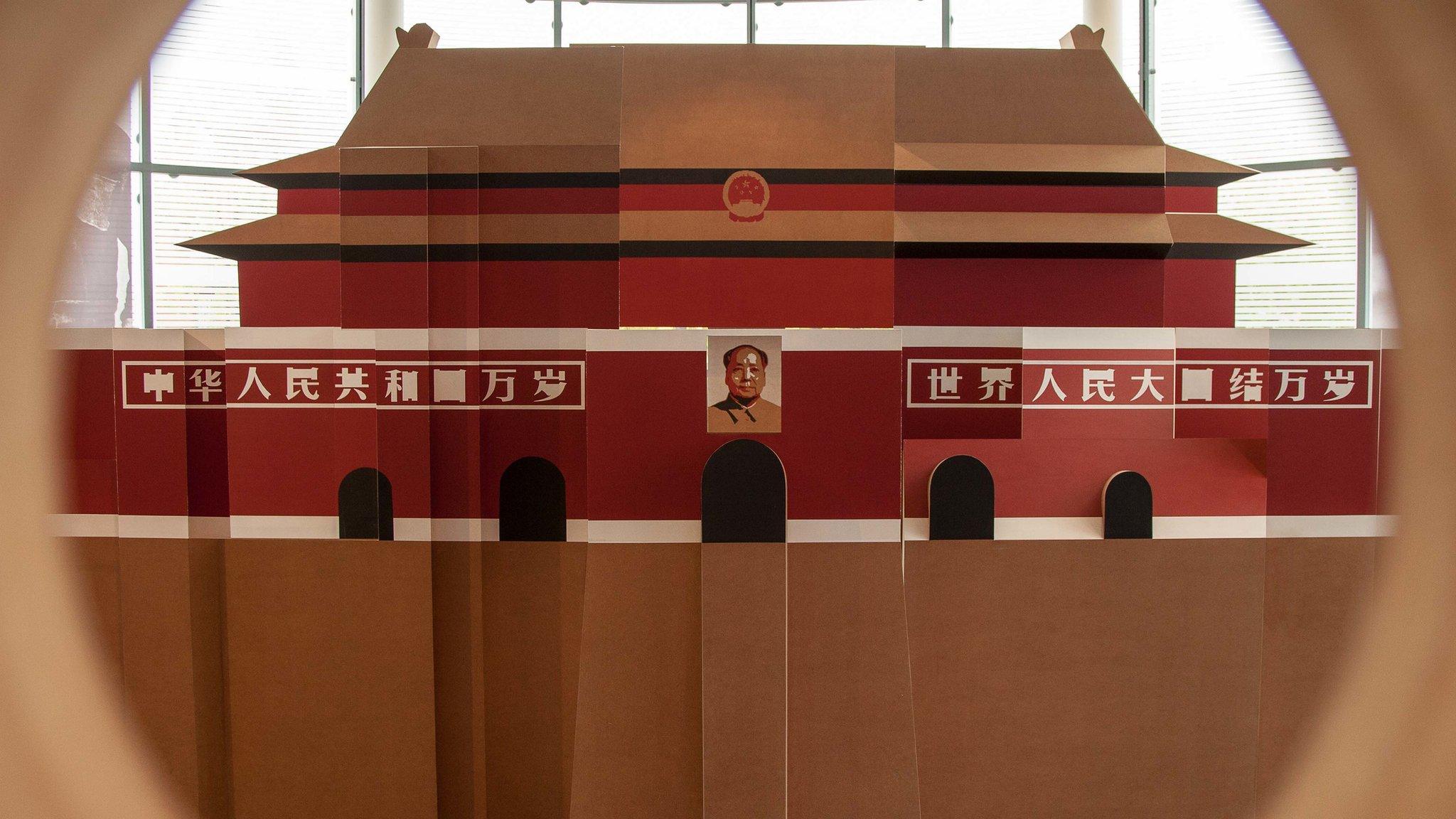
- Published24 May 2014

- Published17 March 2014
